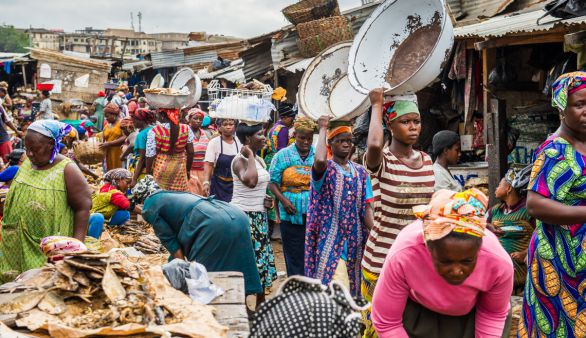HEAT HOUR :
''' '' SIERRA LEONE'S
SENSOR '' '''
'' THE MISSION IMPOSSIBLE '' : WHERE THE HELL IS SIERRA LEONE on Sam Daily Times : 'The Voice Of The Voiceless' ?
AVERAGE TEMPERATURES RANGE FROM the mid-70s Fahrenheit to the high-80s, or 24 to 31 Celsius, with regular peaks in the 100s and 110s Fahrenheit.
In 2020 there were just over about 30 days with an average temperature above 81 degrees Fahrenheit throughout the day. But by 2050, the city expects to have temperatures that high almost half the year, according to predictions by Vivid Economics, a London-based consultancy.
''The past summer in Europe made many people realize that global warming is happening now, but here we've been witnessing this for years,'' Ms. Kargbo said.
BEFORE SIERRA LEONE'S CAPITAL OF FREETOWN exploded into a sprawling metropolis - eating up wooded hills and encroaching on the Atlantic - Eugenia Kargbo loved it for the pristine beaches, lush forests, and green landscape.
Ms. Kargbo, who grew up in the capital in the 1990s, would like to see the city reclaim those vistas, And as Freetown's first chief heat officer, a post created in 2021, that is her seemingly impossible mission : to make the city verdant and livable again by helping it cope with rising temperatures and other climate changes.
These disruptions, along with decades of uncontrolled urban development, have left the capital prone to deadly landslides and annual floods, with heat waves almost all year long.
''HEAT is invisible but it's killing people silently,'' Ms.Kargbo said in an interview on one of the top floors of Freetown's city hall, a massive air-conditioned building that towers over the dozens of informal settlements dotting the capital of the small West African nation.
''Children are not sleeping at night because of extreme temperature,'' she said. ''It affects their ability to learn and their parents' productivity.''
But this is a city of 1.2 million people, up to 60 percent of whom live in makeshift housing with corrugated iron roofs and walls that turn the place into an open-air oven most of the year.
The country is one of the world's poorest; few people have air-conditioning; and there is not nearly enough money to finance ambitious fixes, Ms. Karbo said. Where does one start?
Ms. Kargbo is going for near-term fixes first ''People are suffering now,'' she said.
A 35-year-old mother of two, Ms. Kargbo was a child when Sierra Leone plunged into a decade-long civil war that left at least 50,000 dead. She studied at the University of Sierra Leone and in Milan and began her career as a banker.
As she began raising a family, Freetown started suffering from hotter days and other weather-related disasters., and Ms. Kargbo was drawn toward a role in government.
In 2017, a landslide on the slopes of capital that killed more than 1,100 people served as an ''eye opener into the problems we faced,'' she said.
Ms. Kargbo is one of seven appointed chief heat officers by the Arsht-Rockfeller Foundation across four continents. Kathy Baughman McLeod, the program's director, said she hoped Ms. Kargbo's job would be replicated in other African countries.
As heat officer, Ms. Kargbo has installed a few public gardens that provide tiny oases of freshness to elderly sipping tea under the shade of trees. Her office has also set up canopies in outdoor markets meant to protect vendors selling fish, meat and vegetables for long hours from the blazing sun.
She wants to provide buildings with white roofs that will reflect heat instead of absorbing it, install public fountains and plant many, many more trees.
''This role or something similar will be popping up everywhere, because leaders will need to have visible, tangible action to protect people,'' Ms. Baughman McLeod said. '' Eugenia is the face of heat.''
But for the moment Ms. Kargbo's work, and salary, depends on foreign money. The World Bank, United Nation agencies and private partners, like financial institutions, pay for her projects.
''City Councils in Africa are not well equipped to cope with key but not always obvious phenomena'' like rising temperatures or urban heat islands, said Wanjira Mathai, a Kenyan environmentalist who called Ms. Kargbo's work so far ''remarkable.''
Last fall, Ms. Kargbo was listed as one of 100 rising stars by Time magazine. And she is working on a blueprint for a strategy to combat heat in other African cities.
Critics, though, say she can have only limited effect because the problem is too large for any one official to tackle alone.
From uncontrolled sand mining on beaches to mudslides from hills, ''FreeTown is a geographical hazard which can't be fixed,'' said Alhaji U.N'jai, a professor of environmental science at the University of Sierra Leone's Fourah Bay College.
The Honour and Serving of the Latest Global Operational Research on Climate Changes and African Countries, continues. The World Students Society thanks author Elan Peltier.
With respectful dedication to the Leaders, the people of the entire African continent, and then Students, Professors and Teachers of the World.
See Ya all prepare and register for Great Global Elections on The World Students Society - the exclusive ownership of every student in the world : wssciw.blogspot.com and Twitter - !E-WOW! - The Ecosystem 2011 :
Good Night and God Bless
SAM Daily Times - the Voice of the Voiceless

.png)


0 comments:
Post a Comment
Grace A Comment!